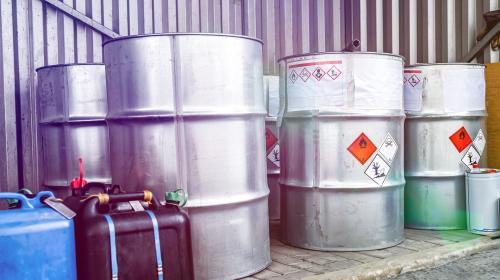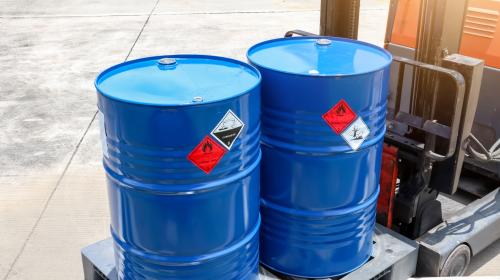RCRA regulations on hazardous waste management protect the environment and human health. Understanding RCRA regulations protects generators from incurring heavy fines and facing lawsuits and criminal prosecution. Here are some of the most common mistakes companies make that lead to heavy fines for noncompliance. We covered common errors #1-3 last week, so be sure to check out our last post, “The Most Common RCRA Regulation Violations: Part I”.
Error 4: Improper labeling.
Because generators often possess many containers (and many employees handling them) there is a lot of room for error when it comes to proper labeling. The RCRA regulations strictly limit the amount of time that hazardous waste may be stored in central accumulation areas. Hazardous waste containers in a 90-day or 180-day storage area should be labeled with the words “Hazardous Waste,” and an identification of the type of waste and accumulation start date, which should be re-checked regularly. For universal waste labels, indicate the "type" of waste (e.g., "batteries" or "lamps"). Do not use unacceptable abbreviations (e.g., "bat" for "batteries"). Chemical containers must be labeled, especially in laboratories, and no "mystery bottles" stored on shelves, cabinets or elsewhere.
If your facility stores used oil, be sure to label the container or pipes used to transfer any used oil with the words “Used Oil.”
To make sure that waste is moved or shipped off site before the clock runs out, generators/employees should also consider tracking and logging container inspections and dates, especially when hazardous waste is first added to the container. Different states have different rules around how containers should be labeled, so be sure to understand your state requirements.
Error 5: Open (or leaking) containers.
Across all states, laws are consistent regarding closing containers – they must be properly closed except while adding or removing waste. Facilities are also responsible for maintaining hazardous waste containers so there are no ruptures or leaks. Funnels, bungs, drum rings, bolts and more must be regularly inspected to make sure they are properly closed and in working order. If the container tips over, it is considered open. Chemical containers must be kept in good condition (no degraded, broken or dusty containers). Store universal waste lamps (such as fluorescent lights) in a closed container at all times. Universal waste lamps must be stored in containers that are "structurally sound", and the containers must remain closed (see 40 CFR 273.13 and 273.33). Be sure to document your inspections and remove and replace any containers that are rusting, cracking or leaking in order to avoid fines and violations.
Error 6: Failing to comply with regulations on ignitable, reactive, incompatible and expired wastes.
Facilities managers must be aware of federal, state and local rules regarding these types of hazardous wastes to avoid heavy fines. Incompatible wastes must be stored in separate containers and separate storage areas. Ignitable and reactive wastes should be stored away from ignition or reaction sources like flames, heat or machinery. Be sure to document and properly dispose of expired chemicals or risk incurring heavy fines – something which large facilities like laboratories, hospitals and universities are especially at risk for violating.
Error 7: Lacking hazardous determinations on file.
All hazardous wastes generated at your facility must have an accompanying hazardous waste determination on file. The most common violations around determinations include keeping outdated or discontinued chemicals at your facility, failing to list wastes at any time during the course of your hazardous waste’s management, or failing to keep copies of determinations. Start by making a list of all the hazardous waste your company generates (remember, this must include hazardous wastes at any time in the course of management including before, during and after any dilution, mixing or altering). Next, find out whether any exemptions apply to your wastes, then categorize your wastes as either “listed” or “characteristic” hazardous wastes. Document "generator knowledge" when it is used to make a hazardous waste determination. Remember to accurately determine your generator status. The exemptions that a facility may use to store hazardous waste depend on the amount of waste generated each calendar month. Losing count of how much hazardous waste your facility generates can lead you to overlook critical management standards, training mandates or reporting requirements that apply to your site. Ultimately, the purpose of your hazardous waste determination is to identify and document properties and characteristics of your waste streams, which may require testing.
Error 8: Failure to have a contingency plan.
Generators of all size are required to maintain contingency plans, which describes the actions employees must take in response to fires, explosions, or unplanned release of hazardous waste to air, soil, or surface water. It is a program in which employees must be trained and a documented plan to protect human health and the environment. In such an emergency, plans will vary by company, but all generators must assign one or more people to act as emergency coordinator. Location of emergency equipment and emergency telephones should be documented, as well as actions each employee should take should an emergency occur. For larger quantity generators, requirements also include detailed contact information for your emergency coordinator, document submittals to local authorities, and the contingency plan document should be located onsite and reviewed frequently. Generators most frequently fail to keep their contingency plan updated to be consistent with their current operations. Be sure to frequently review your contingency plans with your emergency coordinator and all employees so everyone is prepared.
Ultimately, it is up to you, the generator, to make sure you comply with RCRA and state and local requirements for managing your hazardous wastes. If you realize you are making one of these common errors, take action today, and reach out to the experts at Enviro-Safe Resource Recovery for support.
Error 9: Common universal waste mistakes.
Managing hazardous wastes like batteries, lamps, mercury-containing equipment, pesticides and more have specific rules to follow even though universal wastes are subject to less stringent regulations than "fully regulated" hazardous wastes. These wastes need to be managed properly, and management errors can result in a notice of violation during a Federal or State inspection.
Generators can avoid common violations assessed for improper universal waste management by being aware of how their facility manages the waste. 40 CFR 273 specifies standards for universal waste management. Generators can save time and money by complying with the unique rules of 40 CFR 273. Below are various steps to follow to help guide you on how to manage your universal waste.
The first step is to mark the universal waste container with the name of the waste, for example, "Universal waste - Batteries." You must include both the name "Universal waste" and the name of the waste. You cannot use abbreviations. A common mistake is how to mark fluorescent lamps. These cannot be called fluorescent tubes or bulbs. Only "Universal waste - lamps" is correct.
The second step is to mark the container with the accumulation start date. This is the date on which the first piece of waste touches the container. If you do not mark the accumulation start date on the container, you must have an alternate inventory tracking system in place to show you are in compliance of the accumulation time limit, which is one (1) year.
The third step is to store the universal waste in a manner that will prevent releases. For example, when storing fluorescent lamps, an open container is a common violation. You should store fluorescent lamps in a box and secure it with tape or velcro to prevent the lamps from breaking or spilling out of the box.
Lastly, identify your State universal waste rules. The federal rules identify batteries, lamps, mercury-containing equipment and pesticides as eligible for management as universal waste. Various states are authorized to oversee their own hazardous waste program and generators need to ensure they treat the list of universal wastes according to State regulations.
Hazardous waste aerosol cans are now part of the RCRA universal waste program. Check your State regulations to learn if your aerosol cans can be managed as universal waste.



